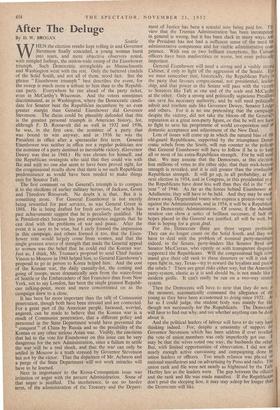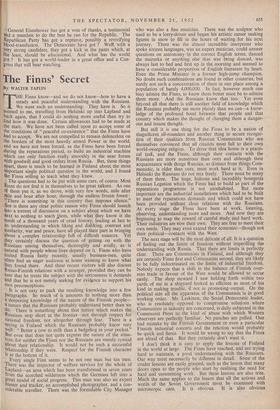After The Deluge
By D. W, BROGAN Seattle WHEN the election results kept rolling in and Governor Stevenson finally conceded, a young woman burst into tears, and more objective observers noted, with mingled feelings, the nation-wide sweep of the Eisenhower triumph. Such Democratic strongholds as Massachusetts and Washington went with the rest. Only the battered citadels of the Solid South, and not all of them, stood fast. But the phrase " Eisenhower triumph " best describes the event, for the sweep is much more a tribute to him than to the Republi- can party. Everywhere he ran ahead of the party ticket, even in McCarthy's Wisconsin. And the voters sometimes discriminated, as in Washington, where the Democratic candi- date for Senator beat the Republican incumbent by an even greater margin than General Eisenhower did Governor Stevenson. The thesis could be plausibly defended that this is the greatest personal triumph in American history, for, although F. D. Roosevelt did as well in 1932 and 1936, he was, in the first case, the nominee of a party that was bound to win anyway, and in 1936 he was the President in office after a spectacular first term. General Eisenhower was neither in office nor a regular politician nor the nominee of a party destined to inevitable victory. (Governor Dewey was that in 1948.) He was chosen for himself, and the Republican strategists who said that they could win with Ike, and with no one else seem to have been proved right, for the congressional results show that there is no such Republican predominance as would have been needed to make things easy for Senator Taft.
The first comment on the General's triumph is to compare it to the elections of earlier military heroes, of Jackson, Grant and Theodore Roosevelt. No doubt it is that. But it is something more. For General Eisenhower is not merely being rewarded for past services, as was General Grant in 1868. He is being drafted for fresh services, for which his past achievements suggest that he is peculiarly qualified. He is President-elect because his past experience suggests that he can deal with the problems of war and peace. After the event it is easy to be wise, but 1 early formed the impression in this campaign, and others formed it too, that the Eisen- hower vote would largely come from women, and that the single, greatest source of strength that made the General appeal to women was the belief that he could end the Korean war. Just as, I think, Mr. Truman's proposal to send Chief Justice Vinson to Moscow in 1948 helped him, so General Eisenhower's proposal to go in person to Korea helped him. And the cost of the Korean war, the daily casualty-list, the coming and going of 'troops, more dramatically seen from the water-front of Seattle or the Embarcadero of San Francisco than from New York, not to, say London, has been the single greatest Republi- can talking-point, more and more concentrated on as the campaign drew to a close. It has been far more important than the talk of Communist penetration, though both have been stressed and arc connected. For a great part of the. American people, harassed, worried, angered, can be made to believe that the Korean war is a result of Communist penetration, that a different policy and personnel in the State Department would have prevented the ' conquest " of China by Russia and so the possibility of the Korean or any other serious Asian war. Visibly, the emotions that led to the vote for Eisenhower on this issue can be very dangerous for the new Administration, since a failure to settle the war will be a real shock, and that the war can only be settled in Moscow is a truth stressed by Governor Stevenson but not by the :victor. That the departure of Mr. Acheson and a purge of the State Department will not work miracles will have to be learned.
Next in importance to the Korea-Communism issue was irritation or anger with the present Administration. Some of that anger is justified. The incoherence, to use no harder term, of the administration of the Treasury and the Depart- ment .of Justice has been a scandal now being paid for. The view that the Truman Administration has been incompetent in general is wrong, but it has been slack in many ways, and the President has not had a sufficient sense of the need for administrative competence and for visible administrative conk petence. With one or two brilliant exceptions, his Cabinet officers have been mediocrities or worse, not even politicallY important.
General Eisenhower will need a strong and a visibly strong Cabinet; if only to fight off the aggression of the Senate. For we must remember that, historically, the Republican Party is the party that favours congressional, not presidential, leader- ship, and that power in the Senate will pass with the victory to Senators like Taft at one end of the scale and McCarthy at the other. Only a strong and politically sagacious President can save his necessary authority, and he will need politically adroit and resolute aids like Governor Dewey, Senator Lodge and others.. For it is no use pretending that the campaign. despite the victory, did not take the bloom• off the General's reputation as a great non-party figure, or that he will not have to fight to save his programme of world co-operation and of domestic acceptance and adjustment of the New Deal.
Lots of issues will come up in which the natural bias of the old-guard Republicans, supported by the triumphant Demo- cratic rebels from the South, will run counter to the policies' that General Eisenhower will have to follow if he is to keeP all or most of his extra-Republican strength. For he will need that. We may assume that the Democrats, at this ele;:tion• lost millions of votes to the other side; that their rock-bottom strength is revealed, and it is still greater than the irreducible Republican strength. It will go up, in all probability, at the next election in 1954, and in Congress, in this presidential yeal, the Republicans have done less well than they did in the of 'year ' of 1946. As far as the forces behind Eisenhower art Adullamile, they will have to be held. And they may be easily' driven away. Disgruntled voters who express a protest-vote volt against the Administration, and in 1954, it will be a Republican not a Democratic Administration. Of course, if the Adana' stration can show a series of brilliant successes, if half the hopes placed in the General are justified, all will be well, NI that is hoping for a great ,,deal. For the Democrats there are three urgent problems They can no longer count on the Solid. South, and they will have to deal with the problem of nominal party-members indeed, in thd Senate, party-leaders • like Senator Byrd and Senator MacCarran, who openly or with transparent disgui supported the Republicans. Will the congressional high cone' mand give their old rank to these deserters or will it risk an open fight in, say, Texas—try to reward the loyalists and punish the rebels ? There are great risks either way, but the American party-system, elastic as it is and should be, is not made like g modern girdle. It can't really be run on a two-way stretch system. Then the Democrats will have to note that they do not, al the moment, automatically command the allegiance of the young as they have been accustomed to doing since 1932. N far as I could judge, the student body was mainly for Ike, though not necessarily .for the Republicans. The Democrats will have to find out why, and see whether anything can he done about it. And the political leaders of labour will have to do very hard thinking indeed. For; despite a unanimity of support for Governor Stevenson which has been seldom if ever rivalled, the vote of union members was only imperfectly got out. It may be that the wives voted one way; the husbands the other. But, with limited opportunities of observation, I did not see nearly enough active canvassing and campaigning. done by union leaders or officers. Too much reliance was placed on national-manifestoes and on advertising by Press and radio. The ,union rank and file were not nearly as frightened by the Taft- Hartley law as the leaders were. The gap between the officers and the rank and file was made manifest. If the Republicans don't prod the sleeping lion, it may stay asleep for longer than the Democrats will like. General Eisenhower has got a vote of thanks, a testimonial and a mandate to do the best he can for the Republic. The Republican Party has got a reprieve, possibly a revivifying blood-transfusion. The Democrats have got ? Welt with a very strong candidate, they got a kick in the pants which, at the least, should be educational. And what has the world. got ? It has got a world-leader in a great office and a Con- gress that will bear watching.











































































 Previous page
Previous page